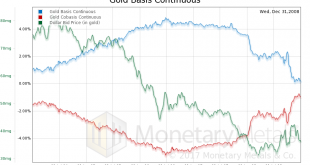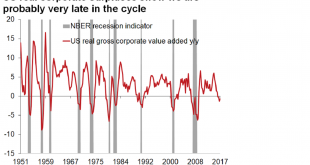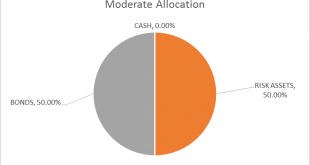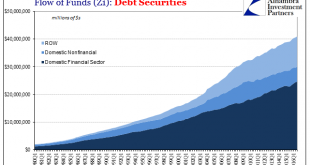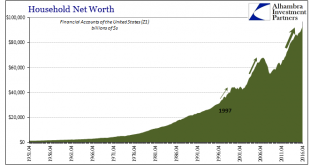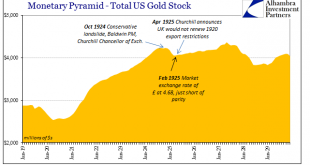ifo Schnelldienst 16/2018, August 23, 2018. PDF.
Read More »“Kosten und Nutzen eines Vollgeldsystems (Costs and Benefits of `Sovereign Money’),” ifoSD, 2018
ifo Schnelldienst 16/2018, August 23, 2018. PDF.
Read More »In Next Crisis, Gold Won’t Drop Like 2008, Report 19 August 2018
Last week, we discussed the tension between forces pushing the dollar up and down (measured in gold—you cannot measure the dollar in terms of its derivatives such as euro, pound, yen, and yuan). And we gave short shrift to the forces pushing the dollar down. We said only that to own a dollar is to be a creditor. And if the debtors seem in imminent danger of default, then creditors should want to escape this risk. The...
Read More »Currency Risk That Isn’t About Exchange Values (Eurodollar University)
This week the Bureau of Economic Analysis will release updated estimates for Q2 GDP as well as Personal Consumption Expenditures (PCE) and Personal Incomes for July. Accompanying those latter two accounts is the currently preferred inflation standard for the US economy. The PCE Deflator finally hit 2% and in two consecutive months, after revisions, earlier this year. - Click to enlarge The inability of consumer...
Read More »More Noise Than Signal
A number of people have forwarded this Bloomberg article – Wall Street Banks Warn Downturn Is Coming – to me over the last couple of days. That fact alone is probably a good argument to ignore it but I can’t help but read articles like this if for no other reason than to know what the crowd is thinking. The gist of the article is that a bunch of sell side analysts think we are nearing the end of the current business...
Read More »Global Asset Allocation Update: No Upside To Credit
There is no change to the risk budget this month. For the moderate risk investor, the allocation between risk assets and bonds is unchanged at 50/50. There are other changes to the portfolio though so please read on. As I write this the stock market is in the process of taking a dive (well if 1.4% is a “dive”) and one can’t help but wonder if the long awaited and anticipated correction is finally at hand. Which means,...
Read More »Money and Credit in Germany
In its April 2017 Quarterly Report, the Deutsche Bundesbank discusses the role of banks in the creation of money. Findings from a wavelet analysis indicate that in Germany, money and credit move in parallel in the long run. In an appendix, the report mentions possible welfare costs of curbing maturity transformation, with reference to Diamond and Dybvig’s work. This is not convincing. Unlike in the typical (microeconomic) banking model, aggregate central bank provided money need not be...
Read More »Do Record Debt And Loan Balances Matter? Not Even Slightly
We live in a non-linear world that is almost always described in linear terms. Though Einstein supposedly said compound interest is the most powerful force in the universe, it rarely is appreciated for what the statement really means. And so the idea of record highs or even just positive numbers have been equated with positive outcomes, even though record highs and positive growth rates can be at times still associated...
Read More »No Paradox, Economy to Debt to Assets
It is surely one of the primary reasons why many if not most people have so much trouble accepting the trouble the economy is in. With record high stock prices leading to record levels of household net worth, it seems utterly inconsistent to claim those facts against a US economic depression. Weakness might be more easily believed as some overseas problem, leading to only ideas of decoupling or the US as the “cleanest...
Read More »Not Recession, Systemic Rupture – Again
For the very few in the mainstream of economics who venture further back in history than October 1929, they typically still don’t go much last April 1925. And when they do, it is only to further bash the gold standard for its presumed role in creating the conditions for 1929. The Brits under guidance of Winston Churchill made a grave mistake, one from which gold advocates could never recover given what followed. There...
Read More » Swiss Economicblogs.org
Swiss Economicblogs.org

